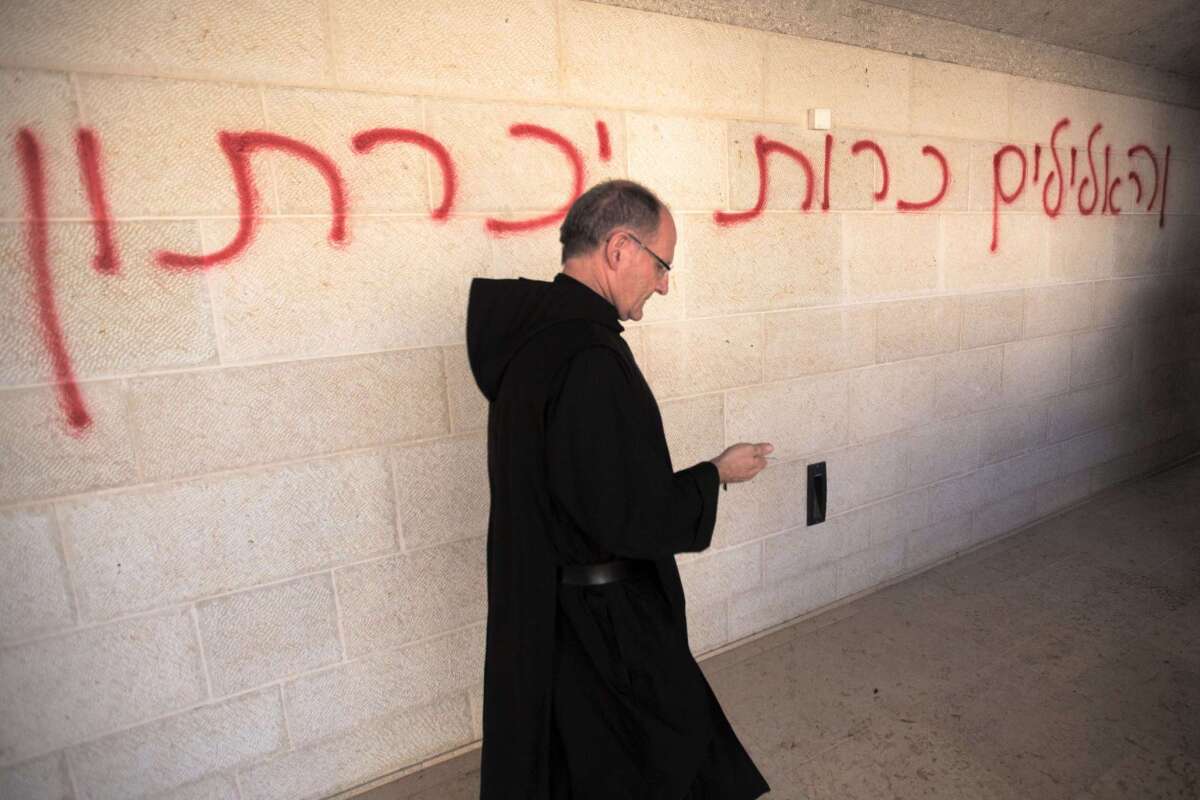Fire damages landmark Christian site in Israel; arson suspected

A priest walks past graffiti reading in Hebrew “idols will be cast out” at the Church of the Multiplication of Loaves and Fishes on Thursday.
- Share via
Reporting from Jerusalem — Fire damaged a landmark Christian site in Israel early Thursday in what police suspect is the latest in a series of hate crimes against non-Jewish targets throughout the country, drawing widespread condemnation and international concern from Christian groups.
Police and firefighters called to the Church of the Multiplication of Loaves and Fish at Tabgha, by the Sea of Galilee, doused the blaze, which started from the roof and damaged several rooms, including one used for book storage and the nuns’ office. A verse from the daily Jewish prayer wishing the eradication of “idols” was spray-painted on the wall.
Two of a dozen volunteers on the premises were hospitalized for smoke inhalation, according to Tiberia police Chief Ran Levy, who told local media that officers were investigating the ”grave incident.”
Police Commissioner Yohanan Danino promised to “do everything” to apprehend the perpetrators. A group of Jewish religious students from the West Bank hiking in the general area were taken in for questioning but released later in the day.
Authorities said the small church community had just begun the day with prayers when the fire broke out at 4 a.m.
The church, which draws tourists from around the world, is housed in a modern complex built over the site of a church that was built in the 4th century and rebuilt in the 5th century. It marks the site where Jesus is said to have fed multitudes with just a few fish and loaves of bread.
Condemnation for the attack on one of the most important Christian sites in the country came from across the political board and from Jews and Arabs alike.
Following the incident, President Reuven Rivlin spoke with Father Gregory Collins, head of the Benedictine order in Israel that runs the site.
“Such terrible desecration of an ancient and holy place of prayer is an attack on the very fabric of life in our country,” said Rivlin, who emphasized that Israel was obligated to protect the sites holy to all faiths, and conveyed his sympathy to the community.
Thanking Rivlin for his call, Collins said the incident was an attack not only on a religious group but also “an attack on Israeli democracy” where “any right-thinking people” stand against such acts. He said the site, which draws more than 5,000 visitors a day, would be closed for three days for repairs.
Gilad Erdan, Israel’s minister of public security, called the attack a “cowardly and base act.” Opposition leader Isaac Herzog urged legal authorities to find the perpetrators of the “criminal and violent vandalism” swiftly. “This is a hate-crime of the worst kind,” he added in a Facebook post.
Thursday’s incident was the latest in a series of attacks against Muslim, Christian and liberal sites throughout Israel and the West Bank in recent years.
After dozens of cases dubbed “price tag” acts against Palestinians and their property in the West Bank, the attacks spread inside Israel to Arab villages, mosques and monasteries, as well as targeting advocates of coexistence. Jewish extremists are presumed to be responsible but perpetrators often are not caught.
“This is not an isolated act of a few extremists or stray weeds,” said Arab lawmaker Aymen Odeh, who said the act was the result of government incitement that “breeds an atmosphere of racism.”
According to Tag Meir, an nongovernmental agency dedicated to combating such acts, 43 churches and mosques have been desecrated since 2009. The group, which makes a point of visiting every vandalized site, called a solidarity visit Thursday to condemn the attack and declare that the act was not the way of Judaism.
“Desecrating a church in Israel is as grave as violating a synagogue in Paris or Warsaw,” they wrote on Facebook.
If the attack was carried out by Jews thinking this strengthens their belief, “I tell them this only undermines their faith,” said Shadi Halul, a spokesman for Aramean Christians in Israel, a minority recently recognized as a separate ethnic nationality.
Halul said such acts are counterproductive to Judaism and Israel, undermining the ideal of coexistence for millions of Christian tourists visiting the country every year. “This is the opposite of how we want them to see Israel,” he told Army Radio.
Sobelman is a special correspondent.
More to Read
Sign up for Essential California
The most important California stories and recommendations in your inbox every morning.
You may occasionally receive promotional content from the Los Angeles Times.













